TRUMP’S TRADE WAR
LUXURY PROPERTIES
Could America’s loss be China’s gain? TAX FACTS FOR YEAR END
Business booming! Bay sets high tide mark for top end real estate Page 5

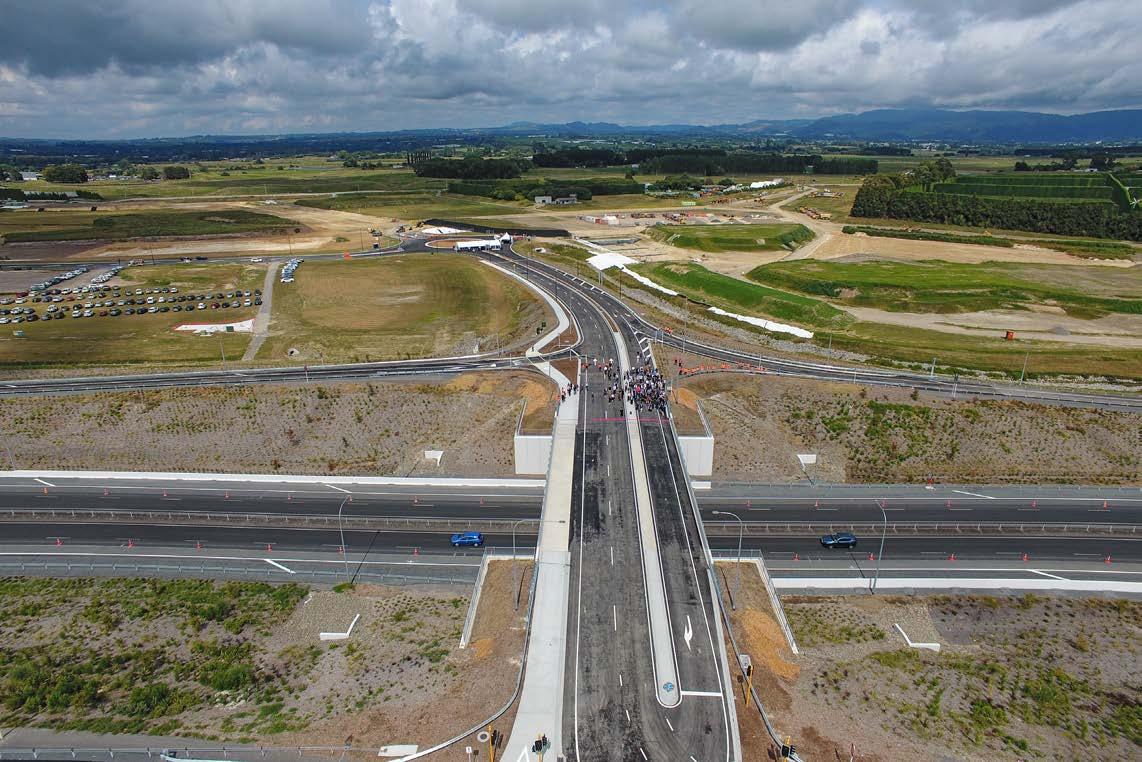

LUXURY PROPERTIES
Could America’s loss be China’s gain? TAX FACTS FOR YEAR END
Business booming! Bay sets high tide mark for top end real estate Page 5


It’s been a hard row to hoe for a new Bay of Plenty business park but developers would not settle for second best. With construction of a motorway interchange now complete, Rangiuru Business Park is expected to create up to 4000 jobs within an easy drive of land designated for new homes.
The project was funded by Bay of Plenty Regional Council’s investment arm, Quayside Holdings, with extra support from the Government’s Provincial Growth Fund.
“From purchasing rural land in 2004 we now have 148 hect-
ares of industrial park ready for business, with 70 per cent of the first stage under contract,” Quayside CEO Lyndon Settle confirms.
“The foresight and close cooperation of local leaders means the vision of an industrial development that supports a liveable local and regional community is now a reality.”
Is your business prepared for the end of the financial year? Deloitte delivers advice > Continuedonpage3


A recent event, which saw minister for regional development, Shane Jones, joined by other elected representatives, local leaders and iwi in attendance, marked completion of the latest stage of the project.








Settle says that: “Despite the Global Financial Crisis, Environment Court delays and rising construction and financing costs, the Bay of Plenty Regional Council and Quayside persevered with $18m of Provincial Growth Funding the stimulus for earthworks commencing in 2021.”
The business park will help maintain the Bay of Plenty’s reputation as a great place to live and do business, Settle expects.
“Four years later, close collaboration between seven lead contractors has created jobs for up to 200 workers during construction, with each additional stage of construction expected to deliver between $16m and $55m of economic benefit to the Western Bay of Plenty District.”
The partnership between Quayside and central government ensured low-cost financing for the project, Bay of Plenty Regional Council chair, Doug Leeder, confirms.
“It [was] a privilege to celebrate another significant milestone,” he said. “From its origins in the SmartGrowth strategy of 2004, Rangiuru is a cornerstone project for our region’s development.
“A collective effort has brought us to this moment and I extend my heartfelt thanks to everyone involved for their dedication





and support to ensure the Bay of Plenty remains a vital part of New Zealand’s growth story.”
The sub-region will not only benefit from jobs created at Rangiuru Business Park, but the development will support horticulture, manufacturing, warehousing and logistics in the area, Western Bay of Plenty District Council’s mayor James Denyer adds.
“The jobs the park creates will also be a catalyst for future housing development, whether in Te Puke or the major proposed developments of Te Tumu or Te Kāinga just adjacent to us here.”
A partial sell-down of shares in the Port of Tauranga could allow Quayside Holdings to diversify investments, reduce risk and help council to keep rates down while maintaining services.
While no decision has been made, and there is no timeframe for any sale, Quayside – BOP Regional Council’s investment arm – is considering options and seeking advice, the organisation’s Lyndon Settle confirms.
“We love the port. It’s an important regional asset and, if shares are sold, we will continue to be a cornerstone shareholder, focused on value creation and ensuring the Port continues to play a positive role in the Bay of Plenty.”
Quayside could reduce its 54.4 per cent shareholding to a minimum 28%. However, council has asked Quayside to ensure any sale optimises value for shares sold and the remaining stake it will continue to hold in the port.
“We are in no hurry – we’ll only sell shares if and when con-








ditions are right, when we can get the best outcome for the region and can meet the parameters for sale set by council,” Settle adds. Quayside could reduce the risk of having most of its investment in one asset and generate resilient returns for council, he expects. Quayside’s investments have grown from $53 million to $3.5 billion over 34 years, with nonport investments increasing from $15m to $580m. Last year, Quayside paid a $45m dividend to the Bay of Plenty, which council used to reduce general rates by an average of $380 per household.
ADVERTISING
Pete Wales, Mob: 022 495 9248
Email: pete@bopbusinessnews.co.nz
EDITORIAL
News Releases/Photos/Letters/ New Appointments
editor@bopbusinessnews.co.nz
PRODUCTION
Copy/Proofs/Graphic Design
Clare McGillivray
Email: clare@bopbusinessnews.co.nz
GENERAL ENQUIRIES
info@bopbusinessnews.co.nz
Bay of Plenty Business News has a circulation of 8000, distributed throughout Bay of Plenty between Waihī and Opotiki including Rotorua and Whakatane, and to a subscription base.
PUBLISHER
Bay of Plenty Business Publications
PO Box 155, Tauranga 3144
Bay of Plenty Business Publications specialises in business publishing, advertising, design, print and electronic media services.


The recent diplomatic stoush between New Zealand and the Cook Islands provided a fascinating glimpse of the possible future of world affairs. Meanwhile, China can be expected to easily take advantage of new US president Donald Trump’s taste for domestic revenge by further cosying up to other major world players and allies, especially in Europe.
Mark Brown, the prime minister of the Cook Islands, one of New Zealand’s long term Pacific allies, was happy to – at least initially! – ignore the demands of our foreign minister. Winston Peters called on Brown to reveal exactly what his small island nation was getting from its new co-operation deal with China, including access to seabed mining rights.
One might expect future recipients of China’s largesse to be equally discreet about exactly what they are receiving in return.
Many observers within and outside the US have not been astounded by Trump’s

rapid fire assault on his domestic political enemies; their surprise has been instigated by his complete disregard for the impact of his actions on long term, traditional US allies.
However, Trump’s claim to have a historic mandate to do pretty much whatever he wants “may be overwrought,” as Chris Jackson (of polling firm Ipsos) said to the BBC. It could be a tactic being used to “justify the sweeping actions they’re planning to take,” he added.
Since ascending to power, Trump has confounded US allies around the world. We have observed the general
chaos his actions have been producing in government departments, many of which have been responsible for, effectively, asserting US ‘soft power’ around the world.
A known devotee of ‘strong leadership,’ Trump has opted to cosy up to Russian dictator Vladimir Putin. While there is a legitimate argument for re-examining the effectiveness of lengthy US support for the Ukrainian resistance to ‘the former Soviet Union’, there’s no evidence supporting Trump’s assertions that Ukrainian president, Volodymyr Zelenskyy, is a dictator, nor that Ukraine started the war.
There isn’t any justification for Trump’s plan to cut Ukraine out of direct talks with Russia regarding Ukraine’s future either.
Recently defeated German Chancellor, Olaf Scholz, said the US president labelling Zelenskyy a dictator was simply wrong and it was dangerous to deny him his democratic legitimacy.
It is sometimes overlooked
that, while the USA undoubtedly suffered many human and material losses during the Second World War, the mainland US was spared the bombing raids that reduced many European cities to rubble. Meanwhile, US industry benefited greatly as production was ramped up and diversified.
Those who had largely gone along with a common US desire to portray the nation as a ‘noble city on a hill’ have not been astounded by Trump’s assault on his domestic political enemies. Their surprise has been at his complete disregard for the impact of his actions on long term, traditional US and world allies.
Trump seems oblivious to the fact that, if he succeeds in his stated aim of requiring Europe to contribute more to its own defence, he risks the continent developing a more independent stance.
That will include European countries being much more receptive to expanding ties with China as a counterbalance to Russia.






















Some may have thought Auckland’s streets were paved with gold but, as recent data indicates, more Kiwis may be betting on the Bay.
As luxury property agents look to recent OCR adjustments to rebuild confidence in ultra premium ($5 million plus) market, REINZ data suggests Auckland’s loss is the regions’ gain, Caleb Paterson of Paterson Luxury Real Estate asserts.
“Figures show a considerable shift in regional demand with Queenstown and Bay of Plenty picking up a share of the very top end of the residential market, potentially at the expense of Auckland.
“The Bay of Plenty’s ultra-premium property market has proved resilient in recent months. Total sales have decreased by 19 per cent since 2020, however sales in the $5m+ price bracket have increased by 6% over this period and they have seen a significant 20% lift between 2023 and 2024.”
Auckland’s share of the highnet-worth home buyer market is shrinking, he said. In 2019, 82% of New Zealand sales over $5 million occurred in Auckland. However, by 2024 this figure had dropped to less than three quarters, at 73%. Auckland’s $5m+ sales fell by 14% over the past year.
Paterson confirms that, while the national market has seen a
decline in total sales, the high-end property sector has experienced greater impact. The data reveals that, in 2024, only 152 properties valued at $5 million or more were sold across New Zealand, a 55% decline from 2021. The total market recorded 72,484 sales across all price points, marking a 19% decrease from a 2021 peak.
“While the $5m+ market makes up only around 1% of the total market, this could represent a noticeable migration of wealth out of the country’s commercial centre,” he says. “Based on current data, at least $415 million worth of homes valued at $5 million or more have been sold in Queenstown over the past six years, 28% of these were in the last year alone. At least another $180 million have been sold in the Bay of Plenty over the same period.”
While the last quarter of 2024 had the lowest sales volume for the year, early indications are that the ultra-premium segment in Auckland has bottomed out but it will see a resurgence over the coming year, Paterson says. This would be a welcome return to growth following a ‘nightmarish’ period where over 40% of multimillion dollar homes were withdrawn from sale due to a lack of
> Ultra-high net worth buyers will often have very specific requirements… this may be the space for a helicopter landing pad where they can take off without aggravating their neighbours or… a property where they can build an indoor horse arena.”
– Caleb Paterson

buyer interest.
“If we are seeing signs of an exodus from Auckland or simply a sharp increase in the number of high net worth families populating regional New Zealand from overseas or other parts of the country, a wealth transfer of this level may have repercussions for businesses in all three regions [Bay of Plenty, Queenstown and Auckland], particularly if it continues on its current trajectory.”
While noting an influx of luxury homes brought on and then withdrawn a few months later as the market stalled, Paterson advises that many homes have re-entered the market over the summer matched by steady levels of buyer interest.
“Looking at our current list-
ings, every single property has had an increase in engagement and viewing over the past month.”
OCR adjustments have had a positive impact on the luxury market.
“Buyers of multimillion dollar homes are less dependent on accessing lending but they are seeing the drop in interest rates as an economic confidence signal and this is now manifesting as an increase in enquiry in this part of the market.”
Paterson Luxury Real Estate offers an advocacy service for the uber-wealthy, identifying houses that are not on the market and offering to purchase them. This type of concierge service is widespread in North America but has not been adopted at the same
level in New Zealand, Paterson adds.
“Ultra-high net worth buyers will often have very specific requirements for their family or holiday home. This may be the space for a helicopter landing pad where they can take off without aggravating their neighbours or a requirement from one of our existing clients who is looking for a property where they can build an indoor horse arena.
“Other clients are looking for the most premium house on the street or some may want the worst house that they can transform into the most luxurious. The buyers will typically pay 10-15% above market rates to purchase something that is not advertised for sale.”













A quick snapshot reveals that the Bay of Plenty may be set for a resurgence. As Bay of Plenty Business News publisher, Pete Wales, confirms.
As we publish our last issue of the first quarter of 2025, we have noticed a slight upswing in business confidence and the activity that flows from this, as shared across our first three issues of the year.
As expected, the RBNZ recently cut rates by 50 base points. With further cuts forecast for the first half of 2025, we are seeing a sluggish NZ economy beginning to slowly turn the ship around and head in the right direction.
With the kiwifruit (Tauranga/Western Bay), tourism (Rotorua) and agriculture/ dairy (Waikato) all leading the charge, a turnaround locally appears likely across the Bay of Plenty and Waikato regions, bringing NZ out of its recessionary setting doldrums.
Such indicators suggest we can expect a return to strength at the start of the new financial year followed by even more growth into the second half of FY25-26.
Over recent weeks, I’ve been giving some thought to the things we need to do to strengthen and grow our dynamic business sector.
In part, this was inspired by hearing the great success stories told at the recent Tauranga Business Awards, which I had the privilege of attending with deputy mayor Jen Scoular and councillors Kevin Schuler, Marten Rozeboom and Rod Taylor.
The evening was a true celebration of some very impressive local businesses and my personal highlight was announcing the Business of the Year winners, Aquaholics Ltd. However, our congratulations go to all of this year’s award winners and finalists – you’re all doing great things in and for your community while making a vital contribution to our economy.
Speaking of the economy, we are also encouraged by the central government’s impetus and focus on economic growth. Recent announcements related to the establishment of Invest New Zealand, a new foreign investment agency to attract foreign investment and capital, will benefit ‘NZ Inc’. It will also help our region

because more successful businesses will mean more taxpayers and ratepayers to share the cost of the services and infrastructure on which we all depend.
Fostering economic growth is not just a matter of opening the gates and hoping people come, we also need the right policy settings and to lean in and tell our story, attend summits and take delegations to the right people and occasions. It’s great to see the government taking a lead in this key area.
At a local level, our aim is to leverage every opportunity for this region to help grow infrastructure, exports and the economy in general. We hope to be an


early participant in the city and regional deals that the government is promoting. This process will establish the agreed priorities for infrastructure investment and set out accelerated timeframes for getting the mahi done.
We have some natural advantages with innovation, business start-ups and growth companies already important contributors to our economy. We need to retain these companies and the people behind them.
We also need to keep attracting and fostering talent. After all, there aren’t many places in the world that can offer the same level of inspiration we can get by climbing Mauao or going for a great surf

as the sun rises or sets on our slice of heaven.
Expanding tertiary facilities are welcome additions for Tauranga as they bring diverse new talent to our city. Future efforts by such talented individuals will help improve our productivity, grow our incomes and contribute high value outputs so that Tauranga continues to lead the nation’s export growth.
Our city is home to some fantastic businesses with huge potential. Council’s elected members are keen to hear your success stories in order to understand what you need to succeed and what we need to do together so that our city can succeed.
So, please take the opportunity to give us your feedback as we consult with the community on our draft 2025/26 Annual Plan. Consultation opens at the end of March and runs through until April 28.
Ngā mihi nui, Mahé Drysdale.
Local property owners believing their land is unfairly labelled a flood risk can now appeal following concessions by the Tauranga City Council, Scott Adams from Tauranga’s Urban Task Force (UTF) confirms.
“This is a significant win for the UTF on behalf of property developers and landowners. They can now get a simple storm water engineering assessment to override [council] mapping.
“This will be particularly useful where there are errors with the flood modelling and map outputs.”
The UTF took their concerns to the Environment Court following Council’s Plan Change 27, which provided framework (in April 2022) to manage the effects of flooding. New flood maps were introduced showing overland flood paths and floodable areas across the city which weren’t previously considered to be at risk. This may have hindered resource consents, development opportunities and impact land prices, the UTF contends.
Representing the city’s property owners, developers and businesses, UTF appealed citing ‘significant errors and inaccuracies’, claiming the maps did not show the most up-to-date flooding information.
Through the appeal process, parties generally accepted that there were ‘technical errors and issues with the mapping’, Adams confirms. An agreement has now been reached ensuring maps are updated and reliable for developers and
landowners.
“Council has accepted through the appeal that a site specific technical assessment on flooding will now prevail over the indicative maps currently shown on the council’s GIS (Geographic Information System) layer.”
The UTF raised further concerns regarding how roadworks might affect flooding.
“Throughout the city, roads are designed to help carry storm water during major floods,” Adams explains. “When council makes improvements to roads (raising their height or adding engineering features), it could cause floodwater to spill onto nearby properties or reduce the ability of storm water to flow along the roads.”
To address this, Plan Change 27 has now been altered and nearby neighbours must be notified if roadworks might cause flooding on their properties. Policies have also been updated to focus on reducing flood risks, rather than just managing activities, Adams adds.
“UTF is pleased with the outcomes from our appeal. However, we would still be keen to hear from any of our members undertaking developments involving land identified as subject to flooding on the council GIS layer to ensure new provisions are being appropriately interpreted and implemented.”
Visit www.urbantaskforce.co.nz for more information about Plan Change 27 and the UTF.
As many, or most, franchise agreements in New Zealand contain sole attention (or sole focus) clauses as well as non-compete clauses, we need to consider whether or not they are essential.
While sole attention prevents a franchisee from operating any other business, a non-compete prohibits them from running a business that could be perceived as a competitor. Both clauses are designed to ensure that franchisees dedicate their full energy and attention to the franchise with the underlying assumption that doing so will generate the best results for both the franchisee and the franchisor.
While these restrictions may have been introduced with good intentions, the franchise sector in New Zealand must now re-evaluate whether such clauses are practical and sustainable in the current economic environment. There are several key reasons why revisiting these clauses is necessary.
Multi-brand franchising – a global trend
In some countries such as the United States, Australia and the UK, it is increasingly common for franchisees to operate multiple franchise brands. This is especially true when the franchises operate in differing categories or industries, allowing business owners to diversify their income streams.
By permitting franchisees to own multiple non-competing franchises, the risks associated with economic downturns, seasonal fluctuations, and unexpected market shifts can be mitigated.
New Zealand’s relatively small and geographically dispersed population makes diversification even more crucial for long term business sustainability. Franchisees who are allowed to run multiple franchises could achieve

contributing to the success of each brand they operate.
New Zealand’s economy is characterised by its limited population and geographic isolation. Unlike in larger markets where franchisors can rely on dense urban populations to sustain their business model, our dispersed communities require a more flexible approach.
If a franchisee in a small town is restricted to operating a single franchise, their ability to maintain profitability can be severely impacted by local economic shifts. Allowing franchisees to operate multiple, strategically chosen businesses can help ensure they remain viable in challenging conditions.
Some franchises naturally com-
plement each other and allowing franchisees to operate related businesses could enhance overall business success.
For example, a food franchisee might benefit from owning a complementary logistics or catering business, enabling them to improve efficiencies and reduce costs.
Similarly, a service-based franchisee might gain advantages from operating a retail business that aligns with their existing customer base.
Such synergies could create win-win situations for both franchisors and franchisees.
The rigidity of sole attention and non-compete clauses can discourage potential franchisees from entering the market as they limit entrepreneurial flexibility. Many business owners prefer to diversify their revenue streams rather than committing entirely to a single brand.
If franchisors wish to attract experienced and capable business operators, they should consider more adaptable franchise


NATHAN BONNEY
agreements allowing for carefully structured multi-franchise ownership.
Restrictive clauses that prevent franchisees from engaging in additional business opportunities may not always align with fair trading principles. In some cases, these restrictions could be seen as overly burdensome, reducing competition and limiting economic growth.
Reviewing these clauses to ensure they comply with modern business practices and legal standards would benefit both franchisors and franchisees.
The New Zealand franchise sector stands to benefit significantly from re-evaluating sole attention and non-compete clauses. By allowing franchisees to diversify their business interests within reasonable limits, the industry can create a more resilient, competitive and sustainable environment. A balanced approach that maintains brand integrity while embracing the realities of the New Zealand market will, ultimately, lead to a stronger and more dynamic franchise sector.
Nathan Bonney is a director of Iridium Partners. He can be reached at nathan@iridium.net.nz or 0275 393 022
A major expansion project should prove a shot in the arm for local healthcare, owners of Grace Hospital, Evolution Healthcare and Southern Cross Healthcare, announced recently.
This ‘significant commitment,’ funded by a multi-million dollar investment, will enhance the hospital’s capacity, says Evolution Healthcare Group CEO and Grace Hospital Board chair, Simon Keating.
“We are considering how best to meet the needs of this burgeoning area, including through additional theatres.
“The development project will also generate a variety of job opportunities during both the construction and operational phases, boosting the local economy and providing valuable services to the community.”
The two healthcare companies will partner with leading doctors to deliver the project. This collaboration will further strengthen the Oropi hospital’s ability to offer more advanced care, improved patient outcomes and a seamless, patient-centred approach, Southern Cross Healthcare CEO, Chris White, adds.
“The continued development of Grace Hospital demonstrates our dedication to enhancing healthcare facilities in the Bay of Plenty region,” he says. “We will continue to play a vital role in the wellbeing of the community by providing exceptional medical services. We look forward to working with local partners, healthcare professionals, and stakeholders to bring this vision to life.”
Evolution Healthcare and Southern Cross Healthcare will provide more details about this project as soon as they are confirmed.

As 2025 continues to speed on by, another tax year (for standard March 31 balance dates) is quickly drawing to a close and there are some key tax issues to consider as you work through your year-end preparation.
Are your debtors unlikely to pay? Unrecoverable debts can only be treated as deductible bad debts if they have been fully written off in your accounts before year’s end.
What is the balance of your imputation credit account? A company’s imputation credit account must have a nil or credit balance on March 31, regardless of financial balance date.
A debit balance at this time will result in penalties. It’s a good idea to carefully monitor this, especially if imputed dividends have been paid out, tax refunds have been received, or there has been a loss of shareholder continuity.
Have you checked your fixed asset register to ensure the correct Inland Revenue tax depreciation rates are used?
New assets should be depre-




ciated from the beginning of the month of acquisition, rather than from the date of purchase.
Pooled assets can be depreciated from the start of the year of acquisition and, if you are writing off assets, make sure they are disposed of by the end of the year.
The ability to claim tax depreciation on commercial and industrial buildings was removed, effective from April 1 2024 for March 31 balance date taxpayers. Have you checked your fixed asset register and has it been updated to take this into account?
Purchased low value assets during the year? Most assets that cost less than $1000 are considered low value assets. These can be immediately deducted rather than depreciated.
There is a catch, however –multiple low value assets purchased at the same time and from the same supplier must have a combined cost of less than $1000 to utilise the immediate deduction.





Have you done a stocktake? A stocktake should be performed at balance date and obsolete trading stock may be able to be valued at its market selling value, where this is lower than cost and you can substantiate the valuation.
Do you have losses to carry forward? Be aware of the shareholder continuity rules and business continuity rules if there have been shareholder changes during the year. A breach of both can result in tax losses being forfeited.
With the Inland Revenue use of money interest rate currently at 10.88 per cent on outstanding tax payments, it may be prudent to use tax pooling to reduce the effective rate of interest. Tax pooling can also provide the flexibility to make tax payments at times that suit your own cashflow patterns.




BY ANDREA SCATCHARD
March 31 is also the end of the FBT (Fringe Benefit Tax) year regardless of your financial balance date. Annual FBT returns and returns for the March quarter are due to be filed by May 31, 2025.
This is an opportunity to use the various alternate rate options available to reduce FBT payable from the standard 63.93% rate. If you are using your own spreadsheet to apply the alternate rate calculation, bear in mind that the formula has changed from 2024.
Year end is a busy time and navigating all of the tax rules and obligations can be a nuisance for people who, understandably, just want to focus on running their

businesses. If you have questions or would like help managing end of year tax affairs, reduce your stress by talking to a tax professional.
Andrea Scatchard is a Tax Partner at Deloitte, based in the Bay of Plenty. She can be contacted on ascatchard@deloitte.co.nz











The year is still relatively new, but time may already be running out to sell your business.
Selling a business takes time, typically six months from listing to settlement. If you want to sell in 2025, don’t wait for your end of year accounts. Starting the process now ensures you have enough time to secure the right buyer and maximise your sale price.
The sale process:
Selling a business isn’t as simple as selling a home. The process involves multiple stages, each requiring careful planning:
• Initial consultation: gathering key business information
• Appraisal and listing: this involves setting a sale price and launching the process
• Information memorandum: creating marketing content to attract buyers

JAMIE SMITH
• Buyer engagement: screening and introducing all potential buyers to clients
• Negotiation: involves agreeing terms and signing a sale and purchase agreement
• Performing due diligence: buyer investigations and condition fulfilment
• Settlement and handover: finalising the sale and assisting with transition
If you want to sell and exit by the middle of the year, act now! Delaying could mean missing out on the best buyers or being rushed into decisions that don’t maximise value.
Many business owners assume they have plenty of time, but delays can have serious consequences such as:
• More time on the market: buyers may see your business as undesirable
• Market changes: economic shifts could impact demand and valuations
• Burnout: owners who wait too long often accept lower offers due to frustration
To determine if your business is in the right shape to sell, contact me, Jamie Smith, for a no-stringsattached appraisal.
I will then assess the health of your business, helping you understand its market readiness and potential value.
Whether you’re planning to sell soon or just exploring your options, this appraisal provides clarity and confidence without any obligation.
It’s a common misconception that we must wait for finalised

financials before listing. While accurate financials are important, they are not required to start the process. The sooner a business is on the market, the greater the opportunities to attract serious buyers. Financial details can be refined along the way.
Act now for the best advantage
Selling a business isn’t just about finding a buyer, it’s about securing the right deal. Starting early allows you to:
• Avoid those stressful, lastminute sales
• Gain more exposure and attract multiple offers
• Strengthen your negotiation position for the best price
• Find a buyer aligned with your business values and vision
Prepared businesses with clear documentation sell faster and at
Want to know the real secret to thriving in 2025? It’s all about your people. As recruitment leaders, we have a front row seat to what makes organisations succeed or struggle – here’s what we’re seeing: the businesses that are going to succeed during this year are the ones putting their people strategy front and centre.
Your ability to thrive isn’t just about product or market position, it’s about having the right people in the right roles with the right mind set.
Here’s what you need to focus on:
First up, stop thinking about hiring as a reactive process. The winners in 2025 are building talent pipelines before they desperately need them.
That means staying connected with potential superstars, nurturing relationships and creating an employer brand that makes peo-
ple want to join your journey.
Speaking of your team, are you really tapping into their potential? The businesses that are going to thrive are the ones creating growth pathways for their people. Think mentorship programs, skill development opportunities and clear career progression. When your people grow, your business grows, it’s that simple.
Culture isn’t just a buzzword anymore – in 2025, it’s a competitive edge. We’re seeing the most successful companies building

cultures in which innovation isn’t just encouraged, it’s expected, flexibility isn’t just a perk, it’s how work gets done, and wellbeing isn’t just a programme, it’s built into the fabric of the organisation.
The truth is that leadership teams need to walk the talk. If you’re saying people are your priority, prove it. This means investing in development, creating
space for new ideas and building an environment where people feel safe taking smart risks.
Let’s talk about diversity, not as a checkbox exercise but as a business imperative. The companies that are going to thrive are the ones building truly inclusive settings where various perspectives aren’t just welcomed, they’re actively sought out.
better prices. As buyers look for confidence and transparency, starting now will put you in the best position.
Start the conversation today
If selling in 2025 is on your mind, don’t wait! As a business broker and former business owner, I can guide you through the entire process, from appraisal to settlement, ensuring a smooth and profitable transition.
Let’s discuss your goals and strategy today. Contact me – 029 770 2113 or jamie.smith@linkbusiness.co.nz – to start planning your exit.
Jamie Smith is a Business Broker at LINK Business BOP. He can be contacted at 029 770 2113 and jamie.smith@linkbusiness.co.nz

BY KELLIE HAMLETT
This is your year to build something special. Focus on your people, invest in their growth and create a space where talent wants to stay and grow.
That’s not just a good HR practice, it’s good business sense. What’s the best part? When you get this right, everything else starts falling into place.
Remember that you’re not just building a workforce, you’re building the foundation for future success. Make it count and Thrive in ’25!
Talent ID’s recruitment and human resource specialists can support your business to thrive in ‘25 through the delivery of key talent and human resource consulting.
Please feel free to talk to contact us by calling 0800 850 080 or emailing kellie@talentid.co.nz.
Something is rotten in the state of Denmark. Or, to be more accurate, in the state of Kmart.
At least according to Alex Gransbury, inventor and founder of Brisbane-based business, Dream Farm Pty Limited, which designed and sells a juicing device called the Fluicer.1
For those unfamiliar with the Fluicer, it is “an easy squeeze citrus juicer that folds completely flat for space-saving storage”.
The Fluicer is truly distinctive and innovative – so much so that it was included in Time magazine’s list of best inventions of 2023.2 (The Fluicer has to be seen to be appreciated, so I recommend readers visit Dream Farm’s website page for the Fluicer at https://dreamfarm.com/fluicer/.)
Why is Mr Gransbury so aggrieved about Kmart? Because, Mr Gransbury alleges, Kmart has blatantly copied the Fluicer
without his company’s permission. And, to add insult to injury, Kmart is retailing its unauthorised copy at 25% of the price of a Fluicer.3
According to an article published by Stuff 4, Mr Gransbury said, “They’ve [Kmart] just taken the best-selling product that we’ve got and gone, ‘Yoink, thank you very much’. It’s un-Australian, and kind of disgusting and disappointing.”
Strong words, I’m sure you’ll agree, to which a spokesperson from Kmart replied, “We conduct thorough checks during the product ranging and development process, to ensure we are not infringing the rights of others”.4
And there’s the rub.
Neither Mr Gransbury, personally, nor Dream Farm have any registered patent or design protection in Australia for the Fluicer.
According to the Stuff article,
Dream Farm chose to patent the Fluicer in Europe and the US, but not in its home market of Australia because of the cost of securing IP protection.
As a result, Dream Farm left the door wide open to Kmart to walk in and launch its own, cheaper version of the Fluicer apparently without consequence.
(Note: If Kmart thinks Dream Farm has no IP rights in Australia, it should think again – Dream Farm could still potentially stop Kmart and seek compensation under Australia’s equivalent of NZ’s Fair Trading Act, the Australia Consumer Law.)
I can empathise with Mr Gransbury and his company; what Kmart has allegedly done is not ‘fair dinkum’.
But I can only empathise so far, for there are (at least) two universal truths in IP: the first is that if a piece of IP is potentially valuable, then it is worth protecting, even if
that means channelling finances to IP protection rather than to stock or marketing; the second is that success breeds infringement (or at least heightens the risk of it), so Mr Gransbury should not have been surprised when Kmart allegedly went ‘Yoink, thank you very much’.
Too many businesses like Dream Farm think that securing registered IP protection is an optional cost. Wrong. Securing registered IP protection when and wherever possible is not an optional cost – it is an essential investment.
The cost needs to be built into the business plan and prioritised, for if you don’t have registered protection when it is available to you then your IP house is built on sand and the tide of competition, whether un-Australian or un-Kiwi or otherwise, is just waiting to come in and wash your foundations away.

BY BEN CAIN
If you are a design-led business and want to know more about IP rights and how you can potentially avoid the kind of situation Dream Farm is in, you can contact me for a confidential, no obligation conversation.
Ben Cain is a Partner at James & Wells. He can be contacted at 07 928 4470 (Tauranga), 07 957 5660 (Hamilton), and ben.cain@jamesandwells.com
1. https://dreamfarm.com/fluicer/
2. https://time.com/collection/best-inventions-2023/ 3. AU$5 for the Kmart ‘folding juicer’ versus AU$19.95 for an original Fluicer, as at 19 February 2025 4. https://www.stuff.co.nz/world-news/360582761/ australian-mans-invention-was-global-hit-then-hesaw-it-kmart-5, by Jamila Filippone and originally published in Sydney Morning Herald
Ten years is a lifetime for some businesses, but Brother is still growing strong after making a major move from Wellington to Tauranga in 2014 – a gamble that has paid off.
Overall, the company has evolved since becoming a Tauranga-based enterprise, expanding into new markets and product categories, Brother NZ’s managing director, Warwick Beban, confirms.
“We’ve developed a huge ecosystem of partners, resellers, distributors and retailers who take our products into the market and we have developed great resilience and diversity. I believe we have shown that the Bay provides an excellent environment for both businesses and the people in those businesses to grow and thrive,” he says.

Movingclosertocustomersandtransportlinks,includingthe PortofTauranga,provedamajorattractionforthecompany.
“Above all, we are focused on delivering an outstanding experience to the tens of thousands of individuals and businesses using our products. We see a very bright and positive future for our business.”
Since becoming one of just a few businesses at the Tauriko Business Estate a decade ago, the
company’s team has witnessed much growth, as Brother’s COO, Manuel Efaraimo, recalls.
“When we first moved in, there were no food outlets – there was a caravan that sold pies and sausage rolls, a Caltex up the hill and that was it,” he says.
“Maybe some other businesses saw us relocate and saw a benefit
to it as well. I don’t know if that is the case or not, but we’ve shared with other businesses how we did it, answered some of their questions, and they’ve subsequently moved in too.”
Relocating was no easy task, however moving closer to customers and transport links, including the Port of Tauranga, proved a major attraction for the company.
The cost factor helped tip the scales in favour of Bay of Plenty, Efaraimo says. Tauranga was 30 per cent cheaper than staying in Wellington and 60% cheaper than moving to Auckland.
“At the time we could see the beginning of the Golden Triangle developing. Transport companies were increasing their focus on the general area,” he confirms.
“Tauranga gave us proximity to connective infrastructure, as
it was still close enough to Auckland, the advantage of being cheaper and [it was] also a city that we thought our staff would want to live in.”

Losing staff was a major concern as the Brother team considered relocating. And yet, all but one of Brother’s 39 people invited to move with the company embraced the opportunity.
“It was about bringing everyone with us on the journey. There was a real family feel to [local] culture and so that was how it was managed. It’s a great place to live and work and it’s been good for our business.”
The move also proved beneficial in meeting sustainability goals – Brother’s emissions have been reduced substantially, in no small part due to a decrease in freight emissions.

A local business is adopting a (relatively) new option which sees a down to earth adopted for our earthly remains.
The first business in Tauranga to become a certified provider of natural burials, Hope Family Funerals is in step with a growing worldwide movement.
“When my parents started helping other families with funerals in 1979, embalming was the default and that did not sit well with them,” the company’s owner, Tony Hope, says. “They wanted the families to
Industry collaboration has supported a unique seaweed product development. At the University of Waikato, we are proudly driving innovation for societal progress and global sustainability, linking knowledge with industry for a better world. Committed to sustainable innovation, our research fuels business, environmental and global societal outcomes.
Arecent collaboration between researchers, working out of our Coastal Marine Field Station at Sulphur Point, and seaweed product developers and manufacturers Premium Seas, has supported the development of a unique, highvalue seaweed extract. Not only does this support a pioneering aquaculture business within New Zealand but it is contributing to the health of our communities through the product’s healing properties.
University of Waikato senior research fellow, Dr Christopher Glasson, and Premium Seas’ founder and CEO, Lucas Evans, worked together on the development stage of a seaweed supplement. They identified an approach to extract the carbohydrate mole-
cule, fucoidan, from seaweed and process it into a high value nutritional supplement.
In August 2024, Premium Seas launched this one of a kind fucoidan extract as a key ingredient in the Purify Me product, Pure Flow. This New Zealand-made nutritional supplement is designed to care for the heart, strengthen immunity, reduce inflammation and improve overall health. Initial market testing by Premium Seas is underway in New Zealand with the next phase seeing its international launch into the United States.
Mr Evans from Premium Seas says the role played by the university was invaluable in helping his business to develop the product to a stage where it is now ready to be exported internationally.

BY PROFESSOR ALISTER JONES
“As an emerging business, Premium Seas has needed to develop products, processes and technical expertise from scratch,” he said. “Working with the university allowed us to connect with technical expertise and resources which, otherwise, we would not have been able to access without significant capital injection.
“Working collaboratively in this way is a glowing example of the meaningful support universities can provide businesses such as ours when working through the challenges of technical product development activities.”
Dr Glasson, a specialist in marine science and aquaculture, provided technical product development support to Premiums Seas.
make that choice themselves, not the funeral home. So, we have always been strong supporters of caring for people as naturally as possible.”
Steadily rising in popularity, natural burials are an environmentally conscious alternative to traditional burials. The practice does not include embalming.
Instead, bodies are laid to rest in a casket made of locally sourced, untreated wood, cardboard or a shroud then placed in a shallow grave where it will decompose more quickly. A tree is then planted on the
plot so the cemetery will, eventually, become a forest or native bush memorial.
“Achieving natural burial certification was a logical next step as it helps us offer all available options to support families to be able to have the farewell they want, with their wishes respected.”
Based in Tauranga, Hope Family Funerals provides a range of funereal options to ensure families can lay their loved ones to rest in a way that aligns with their values, Tony adds.

Identifying a refined extraction process for the fucoidan, he provided expert guidance during commercial scale equipment trials for extraction and drying of the fucoidan extractions. This technical expertise led to improvements to the product quality and yield of the fucoidan.
“It is extremely rewarding to see a novel New Zealand natural product go from a benchtop concept to market,” Dr Glasson said.
“The positive outcome is a testament to the hard yards put in by Premium Seas. It is great to have had the opportunity to work with such an awesome team of people during the development stage –this includes the expert staff at The FoodBowl where the successful scale up was achieved.”
This collaboration is just
one example of the many ways researchers at the University of Waikato Tauranga campus are working with industry to deliver real impact.
Our research connections span all business sizes, from entrepreneurs and starts-ups to international corporations, and across a wide range of industries, from horticulture, industrial design and robotics to aquaculture.
If you have an exciting idea that could be advanced through the expertise of world leading research, contact us today. Email research@waikato.ac.nz
Professor Alister Jones is the Deputy Vice-Chancellor at the University of Waikato. He can be contacted at alister.jones@waikato.ac.nz






Whānau came together with poi swinging during festivities at Rotowhio marae atea at Te Puia.
The New Zealand Māori Arts and Crafts Institute’s Waitangi Day event attracted more than 1800 people.
Te Puia chief executive, Tim Cossar, says the event was a fun experience with good kai resonating strongly with the public.
“Comments I’ve heard from manuhiri (guests) include that they liked the vibe, the relaxed atmosphere, educational elements and whanau-friendly

approach. It’s really important for us to connect with our community in a meaningful way.”
Māori tikanga (customs) and
history were covered in addition to discussions about Te Tiriti (the treaty).
The event involved engagement from a diverse audience and the kōrero (conversation) explored how people interpret information from different perspectives, Mr Cossar adds
“Manuhiri (guests) were highly engaged, found it interesting and learnt something, which is an important part of the national discussion of Waitangi and what we are about as a nation.”
An understanding of Māori culture and coming together was
the event’s focus, Denise Emery, Te Puia’s GM of visitor experience adds.
“We had people from all races and cultures here today and we’re happy to bring them into our whānau and to show them that Waitangi Day is not something to shy away from, it’s something to celebrate together.”
The day included plenty for children including train rides, bouncy castles and face painting as well taonga and kai markets, cultural performances and an exhibition by the NZ Māori Arts and Crafts Institute.
TheReserveBankfamouslycoined‘the2degreeseffect’asthe impactourcompanyhadonthetelecommunicationsindustry.
Untilthearrivalof 2degrees,thetelcomarketwasdominatedbya cosyduopolyofproviderswho dominatedthemarketandcontributedtoNewZealandhavingsomeofthemostexpensive mobilephoneplansglobally.
Wehavebeenonamission tostaycompetitiveandchallengethemarketeversince.
Ourlatestfinancialresults showedthatwecontinueto nabsharefromourcompetitors acrosseverykeysegmentand we’refullycommittedtoensuringthatcontinuesinthecoming years.
Whilethere’snosecretformulatogrowth,Ihavemadea fewobservationsalongtheway.
Questionthe statusquo
As2degreeshasgrownfroman ideatoa$1billionenterprise, manyhavequestionedwhether wecanstilllegitimatelybe
calledachallengerbrand.To me,thishasalwaysseemed reductionist,anover-simplificationofwhattheword‘challenger’actuallymeans.
Achallengermindsetthat naturallyquestionsthestatus quoplacesyouinabetterpositiontofindthosesmalladvantageswhileyourcompetitors arerestingontheirlaurels.You candothisnomatterthesizeof thebusiness.
There’safamiliaradageinbusinessthatyourbrandissimply apromisetoyourcustomers. For2degrees,thispromisehas alwaysbeenaboutFightingfor Fair.
Thepremisebehindthatwas aboutofferingNewZealanders fairerprices,buttodayweare alsofightinginotherways.We arefightingtocreateafairer onlineexperienceforyoung
NewZealanders,wearefightingforbetterbusinessexperiencesforKiwienterprises,and wearefightingforfairerrepresentationinsport.
Respectyour customers
Customerfeedbackisagift.You canalwayslearnsomething fromit,andIfirmlybelievethat peoplewhogiveustheirmoney deserveourrespect. Technologyshouldalways servetomakelifealittleeasier. It’saboutremovingpainpoints andsmoothingthepathtoan experiencethatthecustomer actuallywants.Asabusiness, weneedtodeliverthis.
Neveracceptthe firstdraft
Ineverwanttoseeapresentationthatis100percent complete.Thatmightsound counter-intuitive,butwehave

adoptedaconceptcalledthe ‘80percentdraft’.
Atotherbusinesses,there’s thisideathateverythinghasto beperfectwhenit’spresented totheexecutivesothatyoucan moveontothenexttask.
Theproblemwiththatis two-fold.Firstly,itoverlooksthe factthat theprocessofhoning andeditingcanoftentakeas longasproducingtheproduct inthefirstplace.Infact,thelast 20percentofpolishingcantake evenlongerthanputtingyour initialthoughtsontothepage.
Youneedtobequitedeliberate inhiringteammemberswho
addtothecultureratherthan detractingfromit. Ifyouhiretherightpeople, therightcultureandenthusiasmbecomesprolific,spreadingfromdesktodeskthroughouttheorganisation. Culturemaystartatthetop, butit’ssustainedbythepeoplewhodothehardworkthat keepstheorganisationmoving.

Switchtelco.Stayconnected. GettoBusiness. 2degrees.nz/business
The fourth highly anticipated Flavours of Plenty Festival is starting later this month, with this year’s version promising more events over more days.
Autumn is a time of harvest and an important tourism shoulder season, so 27 March to 13 April is the perfect time for the Coastal Bay of Plenty to share its bountiful produce and culinary creations with locals and visitors alike.
Tourism Bay of Plenty general manager Oscar Nathan says his team has been busy organising the upcoming festival, having recently earned a New Zealand Tourism Award for its Flavours of Plenty collective, which has supported the annual festival since its inception.
“There are more than 50 exciting events in the festival programme this year, from Waihī Beach to Wainui, near Whakatāne.
> “We’re supporting and showcasing all our talented food, beverage, and hospitality businesses as we foster stronger connections between visitors and the heart of our region – its land and people.”
Flavours of Plenty Festival director Rae Baker says several events will particularly appeal to the corporate market, as attendees appreciate unique opportunities to network or socialise with key contacts.
“My top picks for the corporate market would be the Three Whales of Pāpāmoa event at Lantern; Bubbles, Oysters and Canapés at Trinity Wharf Tauranga; and the Farm to Fork and Science to Spirits Evening at Oscar and Otto.
“We’re also seizing the opportunity


TicketholderswillprogressthroughthreeMountMainstreeteateriesduringTheLongestLunch.
to highlight some of the most amazing women in our foodie sector with the Queens of New Zealand Hospitality panel and the Women in Food and Drink Tauranga Networking event.
“At Waihī Beach, there’ll be Friday night cocktail and food matching at Highballing on the Shore. At the other end of the coast, near Ōhope, ticketholders will taste samples from five local producers as they partake in the Discover the Food Secrets of Wainui Tour.”
The popular Battle of the Snack will also return, featuring four up-andcoming chefs and their experienced mentors as they compete to produce the evening’s best snacks.
Oscar says the festival is the most visible component in his team’s culinary tourism strategy, with domestic and international visitors collectively spending more than $132 million on food and beverages in the region throughout last year.


“It’s vital that we support the innovation and showcase the excellence that exists in our horticulture, food and beverage producer, and hospitality sectors.
“One example is our collaboration with Mount Brewing Co., who are producing a bespoke beer during this year’s festival, called Sunseeker, which will be sold around the country.
“We also value the solid partnership
we’ve developed with Toi Ohomai Institute of Technology during each festival because we know how important it is to attract, train, and support the next generation of professional chefs and hospitality staff who are coming through.”
Rae says the Plates of Plenty Challenge, starting on 16 March, is another way to ensure the benefits each festival generates carry on well past its final event date.
“We’re putting together boxes containing nine locally produced ingredients which participating eateries will be able to choose from to create unique festival dishes. This means we’re supporting new connections between growers, producers, and the 26 hospitality venues that will be competing for the two Plates of Plenty Challenge trophies. The intention is that these venues will most likely keep utilising these suppliers for their future needs.
“None of this would be possible without the funders, sponsors, and supporters who have come on board to make this year’s festival happen. We’re very grateful to the Western Bay of Plenty District Council, Whakatāne District Council, Tauranga City Council, Downtown Tauranga, Cooney Lees Morgan, Trevelyan’s, Mount Brewing Co., and Toi Ohomai.”
Check the programme and ticket options at flavoursofplentyfestival.com.

TheQueensofNewZealandHospitalityeventwillfeature(fromleft)PollyMarkus,SophieGilmour,
and








Host: Tall Poppy Real Estate. Venue: Trinity Wharf. Date: Wednesday, February 5, 2025
The first event of 2025, BA5 with Tall Poppy Real Estate, was a hit! CEO Michael Seymour delivered a humorous and engaging presentation, keeping the room laughing, while attendees enjoyed valuable networking at Trinity Wharf.
Photography - Salina Galvan
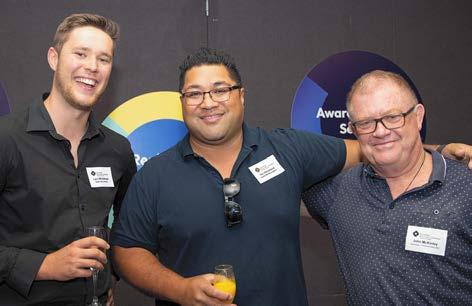




ONE TWO THREE FOUR FIVE SEVEN SIX


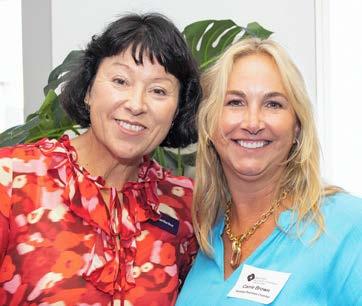

ONELeviWhitehead(KeithHayHomes),TezStrickland(QuestMountMaunganui)&JohnMcKinley(VegaMortgages).TWO DelwynDyson(TallPoppy),JanRodgers&StacieAldersley(GallagherInsurance).
THREEJanetO’Shea(TallPoppy),RyanDuffield&JoeAlley(CKLNZLtd).FOURClaudiaNelson(TheRightStaff)&RobBull(CumberlandConsulting).FIVE MeganMcKinlay(NeazorBrady)&Shulamite Bhanupuri(NZDesignersClub).SIXSusanNorthey(TallPoppy)&CarrieBrown(TaurangaBusinessChamber).SEVEN MichaelSeymour(TallPoppyCEO).
A new, interim chief executive has been appointed for the Western Bay of Plenty District Council following John Holyoake’s resignation in January.
Appointed in February, Miriam Taris will take up the position on March 31. Council expects she will remain in the role until early next year following a full recruitment process set to begin after October’s local body elections.
Miriam will be a familiar face having worked at the council since 2008 and as chief executive from 2014-21.
Since 2021, Miriam has taken several interim chief executive roles in local government, including at South Waikato District Council, New Plym-
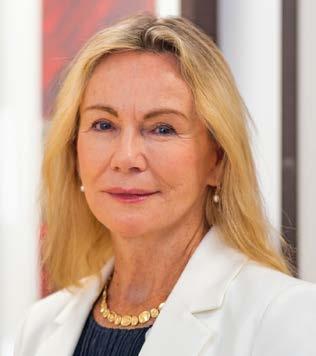
outh District Council and with Taituarā.
Most recently, she has been assisting in a senior role at Wellington City Council.
Western BOP Mayor, James Denyer, is looking forward to Miriam’s return.
“Miriam has a wealth of experience from her time at Western Bay previously and from the wider perspective she has gained having worked at other councils more recently. Council is very pleased to welcome her back as interim chief executive until a permanent replacement is found after the elections.”
James confirms that John Holyoake will remain as chief executive until the end of March.
“I would like to take this opportunity to again thank John for his contribution to our council and the wider district. He leaves council in a good space to continue to serve our communities.”
PMG Funds welcomed Matt Baker as its new chief financial officer, succeeding Nigel Lowe, in February. A chartered accountant, Matt holds a Bachelor of Commerce and Administration from Victoria University and a Postgraduate Diploma in Professional Accounting.
With more than 15 years’ experience in financial leadership in New Zealand and London, he has worked in ‘big four’ accounting firms, fund man-


agement, and banking.
Matt will drive financial strategy, oversee financial reporting and compliance and support property acquisitions and risk management. He is passionate about delivering strong financial outcomes and helping investors achieve their goals, his new employers confirm.
An employment law specialist with extensive experience advising clients regarding legal and employee relations matters, Emily Crutchley is a recent addition to the Sharp Tudhope team.
‘Her clients value her strategic thinking, pragmatic solutions and ability to navigate complex employment
law challenges with a calm, professional approach,” the local law firm stated, ‘She enjoys guiding workplace investigations and conflict resolution processes, and developing thoughtful employee relations strategies.”
Previously based in Hong Kong, Emily was the head of employment legal, Asia Pacific, for a leading US financial institution. During this time, she led a team handling employment legal matters across 11 APAC jurisdictions, providing senior management with strategic counsel on complex regional and global employment issues.
‘Emily has also worked at top tier law firms in New Zealand and Hong Kong, gaining deep experience across all facets of employment law.’

Host: Tauranga Business Chamber
Location: Mercury Baypark Date: 13 February 2025
Photography – Salina Galvan
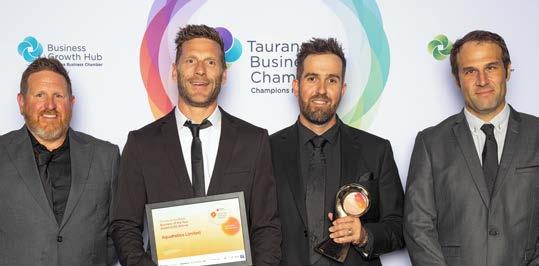








> 2025 BUSIN ESS EXCELLENCE AWARDS
Farmer Autovillage Tauranga Business of the Year Winner: Aquaholics
People’s Choice Award (decided by public vote) –sponsored by Newstalk ZB: Winner: AIMS Games Trust
Best Emerging Business –sponsored by Toi Ohomai Winner: Tū Mai Rā Energy
Employer of the Year –sponsored by University of Waikato
Winner: Stratum Consultants
Excellence in Industry Achievement – sponsored by KingSt Advertising Winner: Fife Lane Kitchen & Bar
Excellence in Innovation –sponsored by 2degrees Winner: Bovonic
Excellence in International Trade – sponsored by Zespri Winner: Oasis Engineering



Excellence in Manufacturing – sponsored by Tauranga Business Chamber Winner: Archishade
Excellence in Marketing Impact – sponsored by Mercury Baypark Winner: AIMS Games Trust
Excellence in Maori/Pasifika Business – jointly sponsored by Pacific Growth Services & Protect for Life
Winner: Future Focus Early Learning
Emerging Leader of the Year – sponsored by HAYS Recruitment
Winner: Viv Pachoud (Hatch Consulting)

